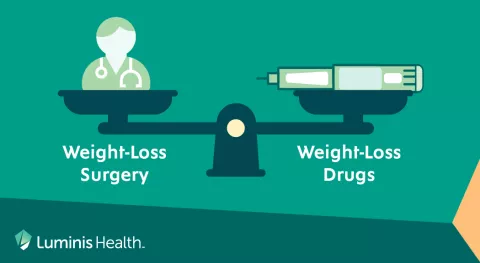Effective January 20, 2026, masks are encouraged for all staff, patients and visitors at all Luminis Health locations and will remain encouraged through the end of the influenza season. Thank you for your patience as we continue to care for our community.

This may be the year you make changes in your life. Losing weight and keeping it off isn’t easy, no matter how hard you try. If you’re considering weight loss surgery, chances are you’ve tried changing your diet and exercise routines many times without seeing lasting results. In fact, if you have a body mass index (BMI) of greater than 35, the chances of reaching a normal body weight for a lasting period of time is less than one percent, according to research by the American Society for Metabolic and Bariatric Surgery. Weight loss surgery could be the answer. If you’ve been wondering if you might be a candidate, we’re here to help you sort through some important considerations. You can start by finding answers to these questions:
Do you meet the medical guidelines?
Weight loss surgery, also known as bariatric surgery, isn’t the right choice for everyone trying to lose weight. In fact, the National Institutes of Health has developed guidelines to help you decide.
It’s worth looking into if:
- You have a BMI of 40 or more (you can calculate your BMI here).
- You have a BMI of at least 35 and a related health problem such as type 2 diabetes, heart disease, high blood pressure or sleep apnea.
- You have a BMI of at least 35, and type 2 diabetes that’s difficult to control.
Do you know the benefits and risks?
Surgical weight loss changes how your digestive system works, reducing the amount of food your stomach can hold and calories your body can absorb. It also affects how some hormones work, which assists in weight loss. You should work with a multi-disciplinary team to choose the type of surgery that fits your needs, such as gastric bypass, sleeve gastrectomy or a new option called SADI-S (single anastomosis duodenal-ileal bypass with sleeve), which combines the restrictive power of a sleeve gastrectomy with the malabsorptive power of the gastric bypass.
The results can be life changing. Weight loss surgery helps people lose as much as 77% of their excess weight 12 months later. It also helps people live longer healthier lives and can prevent or improve more than 40 obesity-related health issues, including:
- Heart disease
- High blood pressure
- Joint pain
- Sleep problems
- Type 2 diabetes
- Obesity related cancers
What’s more, many people who’ve had weight loss surgery say they feel more energized, can move around more easily, and enjoy a better quality of life. For most people, these benefits far exceed the risks. But before signing up, you should talk to a surgeon to make sure you fully understand your risks.
Are you ready to commit to a long-term change?
It’s important to remember that the life-long benefits of surgery come along with a long-term commitment. You will need to meet program requirements, including nutrition classes, to be approved for your procedure. A bariatric optimization program, which includes physical therapy and nutritional guidance, can help.
After your surgery, you will have to follow specific plans to best utilize the changes in your body and optimize for success. You’ll also need to carefully stick to a nutrition plan and attend follow-up appointments to keep your progress on track.
Have you researched the specifics?
Some insurance plans cover the costs of weight loss surgery, including Medicare and some Medicaid programs. As part of this coverage, be prepared with certain records to show why you need the procedure.
Your medical team will help you understand your options for paying for your surgery and tell you about other information you need to know ahead of time. Some healthcare systems offer educational sessions, such as the free weight loss seminar hosted by Luminis Health, to help you get the process started and understand these details before you move forward. Luminis Health is hosting virtual seminars throughout January and February.
Have you considered all you have to gain?
If you’re interested in weight loss surgery, it’s worth taking the next step. Remember, it’s not about what you have to lose, it’s what you could gain with a strong team by your side: better health, a more active lifestyle and greater self-confidence. If you’re ready to take the next step, please call (443) 481-6699 or click here to sign up for a free webinar.
Dr. Alejandro Gandsas, Dr. Courtney Doyle, and Dr. Jilian Nicholas are bariatric surgeons at Luminis Health.



